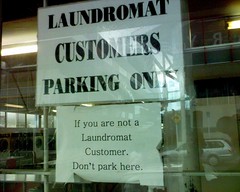
I'm writing to you from the
Booklovers B&B where the internet is slow but the atmosphere is faanntastic. (And, of course, interesting books line the shelves)
Wellington is groovy as always, and my
presentation this morning was another step in finding my best presentation style. More on that later.
But for now, a constructive grumble.
It was on my fifth support call to
Maxnet that I realised why I'd become interested in management all those years ago.
I started in advertising. If you think a little bit about advertising, you want to learn about marketing. Marketing is about making promises. If you make promises, you want to keep them. If you want to keep them systematically, you have to have a system in place. Hence, management.
Maxnet is experiencing systematic problems right now that are preventing it from fulfilling its potential.
Since Saturday night I've been trying to switch my domain to a new registrar before launching our new SimonYoungWriters' site (I won't link because there's nothing there at the moment!).
I could bore you with a long story, but I'll summarise what's up with Maxnet, and how they (and every business) could do a better job:
- Do the thinking for me. When I phoned late on Saturday night, and then again on Sunday morning, I got the same recorded message: "Unfortunately our operators can't take your call at this time". I didn't have the presence of mind to check their hours of operation, or I would've saved myself a lot of stress. But why don't they put their hours of business in their answerphone message?
- Get the staff you need. My righteous indignation hit a high when I waited on hold for 10 minutes, only to get automatically put onto an answerphone. Not what I want as a customer!
- Give staff the tools to help. When I finally talked to someone it was using my cellphone, calling from Auckland airport. It was a relief to talk to someone, but they couldn't help. The webmaster's in tomorrow, he said. Great.
- Don't be so frickin' cheap. And that's another thing. I had to pay for the call, even though it was Maxnet's system that wasn't delivering the results I needed. They have an 0800 number, but you can't call it from a cellphone or from within Auckland.
I think that's all, and it looks a lot less when I see it in bullet point. But each of these bullet points caused me a lot of grief, and it got worse, the less responsive Maxnet appeared.
Tonight I spoke with a helpdesk guy named Stephen. From him I discovered that my issue was a priority, that several members of the team were aware of it, and that there had been other, similar issues on rare occasions before.
That's great, but why didn't anyone email me or phone me? I want to know something, even if that something is "we're working on it".
Even then, I had to prod and poke Stephen. He would've been quite happy to let me wait until morning to talk to an expert. This is my business, I told him. Is there anyone who can help me right now, because right now is when I need help.
Then the helpfulness came. Stephen plumbed all the knowledge he had on the subject, and shared possible scenarios, used his creativity and imagination. We didn't get there, but we got further than we had been.
Why is it so hard to get people to be completely present to help you in these service situations? Why do I have to be more assertive than I feel comfortable with to get what is simply my due as a customer?
All questions to ponder. And I don't completely blame Stephen or his colleagues for the bad service they've given me. It's a systemic problem that must be dealt with in a systemic way. Not a mechanical system, but a growing, learning organic system that gets better over time.













